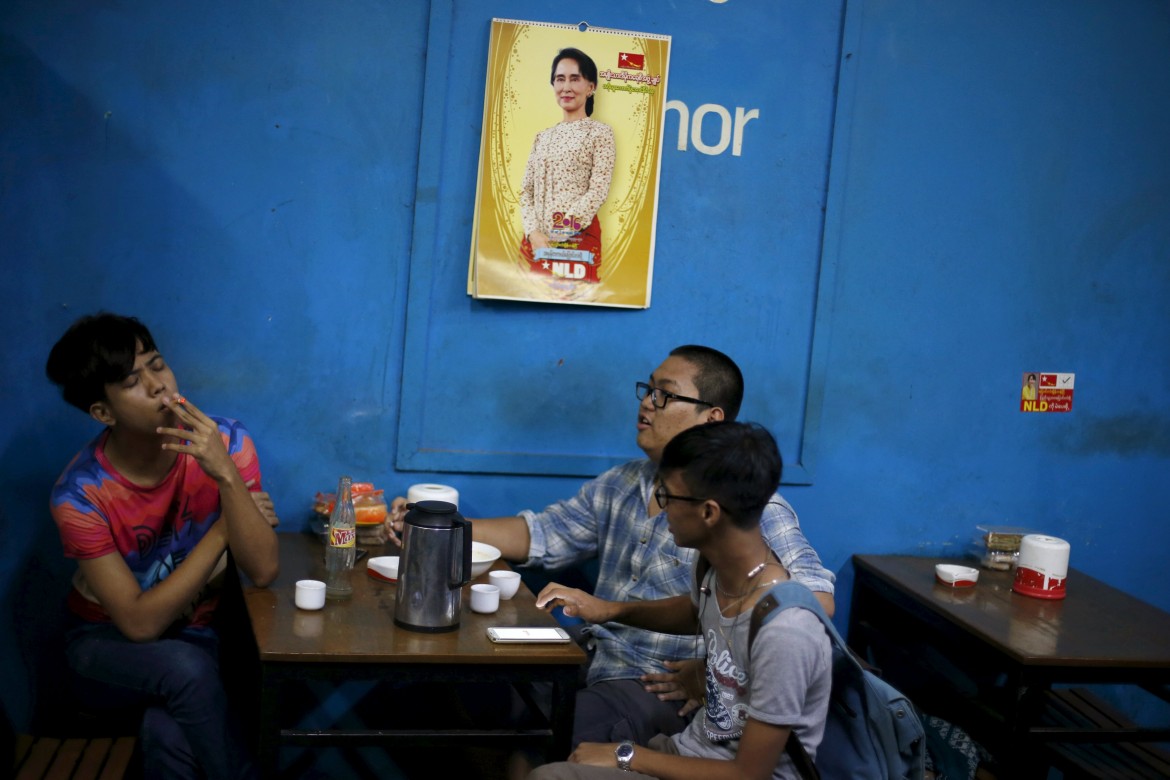Myanmar junta: ‘We lost’
Burma elections The party of Aung San Suu Kyi was poised to sweep the first free and fair elections as the military dictatorship indicated a willingness to step aside peacefully.

Burma elections The party of Aung San Suu Kyi was poised to sweep the first free and fair elections as the military dictatorship indicated a willingness to step aside peacefully.
The Burmese streets were crowded on Sunday with golden, fighting peacocks embroidered on the red flags of the opposition party. Citizens celebrated the first relatively free and fair presidential election in many decades for Myanmar. By Monday night, the ruling military junta had already signaled defeat, telling Reuters: “We lost.”
The country, formerly known as Burma, has been ruled by a military dictatorship for almost 50 years. The previous elections in 2010 were boycotted by the National League for Democracy (NLD), the party led by Nobel Peace Laureate Aung San Suu Kyi, “the Lady.”
At the time, the famous democracy icon was still under house arrest; she was released a week after the elections. Following the military coup of 1962, there was one attempted election in 1990, in which the NLD won a landslide victory. But inexplicably, the military junta denied the result and maintained dictatorial power. On Sunday, however, there were 150 European Union observers monitoring the process, and the military seemed willing to accept the result.
Ninety parties competed in the contest, illustrating the complexity of the country’s ethnic tapestry. The British Empire brought together, under a single colonial administration, territories inhabited by people of cultures quite different from one another: Among the officially recognized ethnic groups, there are the majority Bamar, the Karen, the Kayah, the Kayin, the Kachin, the Shan, the Chin, the Mon and the Rakhine. There are also the ethnic Chinese, the Panthay, the Burmese of Indian origin, Anglo-Burmese and Gurkha, to name some others.
The country has been cursed by bloody civil wars since its independence in 1948, pitting the central Burmese army against the minority oppositions and their armed groups. After lengthy negotiations, supported by the United States, the government and some rebels signed a ceasefire on Oct. 15. The goal is to bring about a federal state in which diverse groups exist peacefully and respect each other’s identities.
But not everyone is on board, for various reasons: Some armed groups control drug trafficking corridors and valuable natural resources, and others distrust the notion that the government in Naypyitaw is willing to respect equal rights for all. Fighting in the jungle continues.
If democratic elections become a regular occurrence, there’s another major obstacle to being truly free and fair. Many candidates of the Muslim minority aren’t allowed to run, and most Muslim residents are barred from citizenship and disenfranchised.
In the years of the so-called “transition to democracy,” social conflicts have been exacerbated, principally among them the treatment of Muslims by the Buddhist majority. An influential group of monks called the Ma Ba Tha has taken a fundamentalist position against the coexistence of religions, lobbying the government to restrict inter-faith marriages.
Votes were still being tabulated nationwide, but early indications pointed to an overwhelming victory for Suu Kyi’s party over the ruling Union Solidarity and Development Party (USDP). Poll results in urban areas showed parliamentary seats going exclusively to NLD, and NLD officials said tallies in the countryside suggested the party would win at least 70 percent of Burmese Parliament.
But the ultimate reaction USDP is unpredictable. And it’s not clear who would be named as president under an NLD-led government. Suu Kyi herself is disqualified by a constitutional provision passed in 2008 that prohibits anyone with foreign family ties from holding the office. Suu Kyi’s two sons are British citizens.
Tensions are still high, as shown by violent attacks on NLD candidates in recent weeks. Myanmar, sandwiched between India and China, is at a crossroads of important transformations happening in Asia and the world. When they talk about the future, Burmese in Yangon are prone to say, “We have a long way to go.”
- An Italian version of this article was published at il manifesto on Nov. 9 2015
I consigli di mema
Gli articoli dall'Archivio per approfondire questo argomento